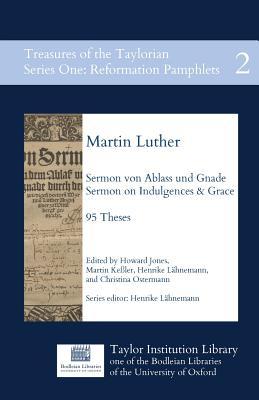The Sermon von Ablass und Gnade (Sermon on Indulgences and Grace) is a seminal text for the Reformation: it is the first vernacular statement of Luther's views on the question which led to his break with Rome; the first printed work of his to reach a mass audience; and the first example of the direct, arresting style which became the hallmark of his German writings. The work hit the market 500 years ago, in the second half of March 1518, five months after the posting of the 95 Theses, and within three years at least 24 editions had been printed in various parts of Germany and Switzerland. The volume is based on two of these editions, copies of which are held in the Taylor Institution Library: Arch. 8 G. 1518 (5), printed by Pamphilus Gengenbach in Basel, and Arch. 8 G. 1518 (6), printed by Valentin Schumann in Leipzig. It presents a guide to the theological, historical, material, linguistic, and stylistic importance of this work.
The Sermon rejects scholastic teaching about indulgences and proposes instead a theology of grace. Luther meant the Sermon as an accessible summary of his views, and for the modern reader it is still the most succinct account of Luther's side in the indulgence controversy, serving as an introduction to the more technical 95 Theses which are also included in Latin, a new English translation by Howard Jones, and explanatory footnotes in this edition. The theological and historical context of the Sermon and 95 Theses is complex and dates back centuries before the actual texts. Martin Ke ler explains this background and provides an evaluation of both works in 'Theological and Historical Background'.
This volume includes a side-by-side facsimile of the two Taylorian copies on facing pages which is complemented by a digital reconstruction of the broadsides from which they were printed, available with all content of the book on editions.mml.ox.ac.uk, prepared by Emma Huber. The printed text is based on the Leipzig edition and a new translation into modern English by Howard Jones. Henrike Lhnemann offers a detailed guide to the book-history in 'The Taylorian Copies' (including an analysis of the woodcuts in the Basel edition and the marginalia added to the Taylorian copy of the Leipzig edition), a preview to the follow-up pamphlets in the debate, and an account of the acquisition history by Christina Ostermann.
